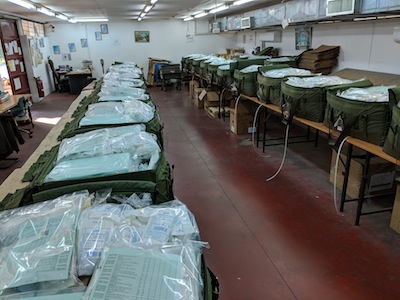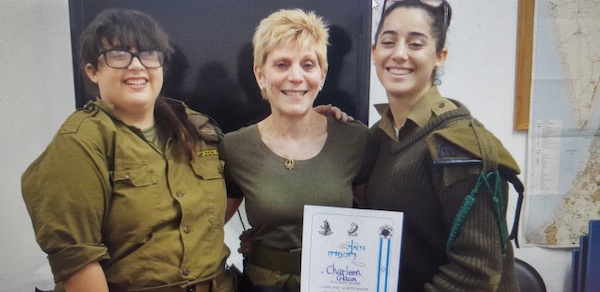Charleen Glaun, centre, receives her certificate of service from Sar-El from madrichot Inbar, left, and Carmel. Glaun hopes to volunteer with Sar-El annually from here on out. (photo from Charleen Glaun)
At last, I was on the plane to Israel. Was this really happening? I had waited so long for this day and, here I was, after 32 years, finally returning.
Arriving at Ben-Gurion Airport, I proceeded through the security check-in. The first question asked of me was, “What is the purpose of your trip?”
“I’m coming on Sar-El,” I replied.
“What is Sar-El?” the security person asked.
“Volunteers for Israel,” I said, a little surprised he did not know about Sar-El.
I waited for his reaction, but there was silence. I blurted out, “I’ve been away for 32 years and this is my first trip back.”
He looked up from examining my passport and said, “What took you so long? Welcome back!”
I smiled and said to myself, “This is going to be the best adventure of my life! Thank you, G-d, for getting me here safely.”
Once I had my luggage, I found the sunglass stand where volunteers typically meet, and found Sar-El’s facilitator, Pam Lazarus, an expat who made aliyah 17 years ago. Since its founding in 1987 by General Aharon Davidi, volunteers come from around the globe for one- to three-week stints on an army base. Qualifications include a love of Israel, being of sound mind, having a clean bill of health, being physically fit and able to carry your own luggage. You do not have to be Jewish. There is a registration fee and the volunteer is responsible for the cost of the flight to Israel. While on the base, each person is assigned a room, which they will typically share with one or more people, and is given three meals a day. Some bases will even organize a free day trip to somewhere of interest, but individuals must fill their own weekends.
I was assigned to a medical supply base near Tel Aviv. This base does not have soldiers on it but rather reservists and full-time employees.
When I arrived at the base, I was given my army uniform. The correct size is not high on the priority list, I discovered. I spent the next three weeks in a very roomy pair of pants, which I held up with a belt, a khaki T-shirt and shirt, and an army jacket. I felt so proud wearing this uniform!
Army-issue clothing in hand, it was time to see where I was going to live for the next while. I had a roommate for my first four days, but had the space to myself for the remainder of my stay. Women are housed on the upper level of a two-storey building. Both floors have a washing machine. (Apparently, this is quite a luxury and not the norm.) All rooms have an air-conditioning/heating system and basic storage units. Three shower stalls delivered hot water at all times. I was at the Hilton of army bases! (I found out from my representative in Toronto that the living quarters on the base were newly renovated.)
A typical day is as follows. Breakfast in the main dining room is at 7:15 a.m. At 7:45 a.m., we meet up with our 19-year-old madrichot (supervisors) in the courtyard for the raising of the flag and the singing of the national anthem, and we get news from within Israel and abroad. Then, it is off to work until midday, when we make our way to the dining hall for lunch.
This base is the main military medical base in Israel and also the primary depot. Every 18 months, medical military units drop off complete medical supplies. They then pick up new and replenished supplies for the next 18 months, which are divided between bases. Medical supplies with expiry dates between six and 18 months are used first in hospitals and emergency rooms, while supplies with a six-month expiry date are used for training purposes and donations to developing countries. Medical kits are made up for many applications, such as atomic and biological chemical kits, combat doctors, and combat medics.

I had a great boss, Israel, who patiently explained exactly how to do things. Israel is a Bukharian Jew, a first-generation Sabra. He never stopped thanking us for our service, as did many Israelis I met off the base. They are grateful for the volunteers’ service. This, in turn, was so gratifying for us, knowing we were making a difference by giving back just a little to the country. It was an even better feeling when medical backpacks were returned to us with medical supplies unused.
The workday ends at 4 p.m., when volunteers are free to do whatever they like within the confines of the base. They are not at liberty to leave it, other than at the end of the workweek. Dinners are eaten early. Thereafter, the madrichot hold discussion groups or show movies. By 9 p.m., most people are ready for bed.
Weekends, volunteers may go anywhere in Israel, as long as we are at Tel Aviv’s main train station on the Sunday morning at 9:30, when we are taken back to our base. At present, there is a hostel in Tel Aviv specifically for Sar-El volunteers’ weekend stays. Accommodation is free, with meals included. This is a great alternative for those who are on a tight budget. It is not fancy, but it is near Tel Aviv’s hub and the beach.
One tends to forget that one is in a country in a constant state of war. The zest for life is unbelievable, which I noticed on my weekends in Tel Aviv. The bustling traffic; people sitting at coffee shops and in restaurants, or shopping at the Carmel Market; youngsters speeding down busy main intersections on their electric scooters; hip-looking men and women walking along the beautiful promenade with their dogs; beachgoers laughing and listening to music; picnickers on lawns with little children frolicking nearby; buskers entertaining the passing throng. What a beautiful, perfect picture it painted in an imperfect world.
Three weeks went by in a flash and soon it was time to return to Toronto. I looked for any reason that would enable me to stay, but, as the saying goes, all good things must come to an end. But it doesn’t have to end permanently. I will return to Israel. In fact, I am already looking at calendar dates.
I would highly recommend Sar-El for anyone who loves Israel and wants to do something worthwhile. Israel will welcome you with open arms and she will thank you.
To learn more about how you can experience your own “do good, feel good” adventure of a lifetime, email toronto@sarelcanada.org.
Charleen Glaun is a receptionist/caterer for an oil company in Toronto. She made aliyah in 1975 and spent the next 13 years traveling between Israel and South Africa, where she was born. Though aware of Sar-El since 1986, she did not have an opportunity to return to Israel until her December 2018 trip with the organization. Her heart has always been in Israel so, for her, the 2018 trip was “going home,” and she plans on returning with Sar-El before the end of this year, and each year going forward.

